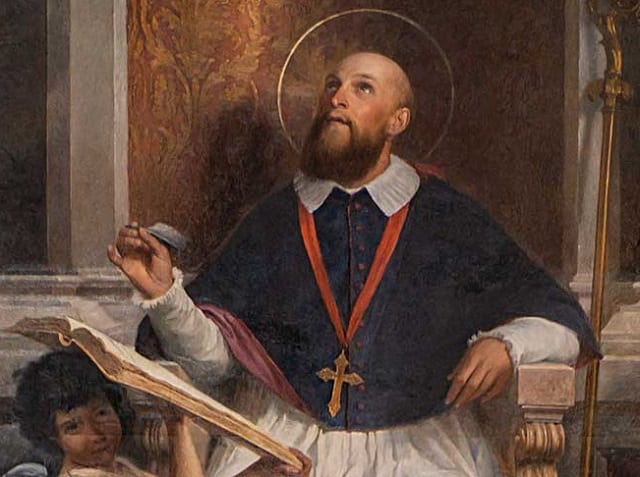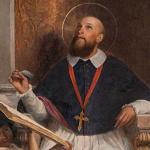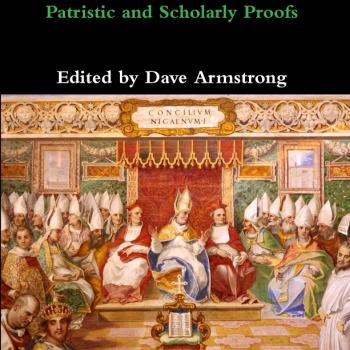
This is one of a series of extensive excerpts (with my occasional commentary) from The Catholic Controversy (1596): a classic of Catholic apologetics (originally a collection of pamphlets), written by St. Francis de Sales (1567-1622): a Doctor of the Church [see all the installments by searching “Salesian Apologetics #” on my blog sidebar search function]. Any comments of mine (apart from lists of related links) will be in blue. The rest is from the online, public domain text (3rd revised edition, New York: Benziger Brothers, 1909; translated by Henry Benedict Mackey, O.S.B.).
What I present is an edited abridgment, designed for modern readers: so I will dispense with the constant tedious use of ellipses (“. . .”). I will cite the section of the book used, so that anyone who desires it may consult the full text and/or particular contexts, patristic references (which I omit), etc. I will follow the custom of my paperback TAN Books edition: of italicizing scriptural passages.
*****
Part II, Article V: Chapter 1: The Authority of the Ancient Fathers is Venerable
Theodosius the Elder found no better way of putting down the disputes of his time concerning religious matters than to follow the counsel of Sisinnius, — to bring together the chiefs of the sects, and ask them if they held the ancient Fathers, who had had charge of the Church before all these disputes began, to be honest, holy, good. Catholic and Apostolic men. To which the sectaries answering, yes ; he replied : Let us then examine your doctrine by theirs ; if yours is conformable to it let us retain it, otherwise let us give it up. There is no better plan in the world. Since Calvin and Beza own that the Church continued pure for the first six hundred years, let us see whether your Church is in the same faith and the same doctrine.
And who can better witness to us the faith which the Church followed in those ancient times, than they who then lived with her, at her table ? Who can better describe to us the manners of this heavenly Spouse, in the flower of her age, than those who have had the honour of holding the principal offices about her ? And in this aspect the Fathers deserve that we yield them our faith, not on account of the exquisite doctrine with which they were furnished, but for the uprightness of their consciences, and the fidelity with which they acted in their charges.
One does not so much require knowledge in witnesses as honesty and good faith. We do not want them here as authors of our faith, but as witnesses of the belief in which the Church of their time lived. No one can give more conclusive evidence than those who ruled it : they are beyond reproach in every respect. He who would know what path the Church followed at that time, let him ask those who have most faithfully accompanied her. The wise man will seek out the wisdom of all the ancients, and will he occupied in the prophets. He will keep the sayings of renowned men (Ecclus. xxxix. i, 2). Hear what Jeremias says (vi. 16) : Thus saith the Lord : stand ye on the ways and see, and ask for the old paths, which is the good way, and walk ye in it ; and you shall find refreshment for your souls.
And the Wise Man (Ecclus. viii. 11): Let not the discourse of the ancients escape thee, for they have learned of their fathers. And we must not only honour their testimonies as most assured and irreproachable ; but also give great credit to their doctrine, beyond all our inventions and curious searchings. We are not in any doubt as to whether the ancient Fathers should be held as authors of our faith; we know, better than all your ministers do, that they are not. Nor are we disputing whether we must receive as certain, that which one or two of the Fathers may have held as opinions. Our difference is in this : You say you have reformed your church on the pattern of the ancient Church ; we deny it, and take to witness those who have seen it, who have guarded it, who have governed it: — is not this a straightforward proof, and one clear of all quibbling ?
Here we are only maintaining the integrity and good faith of the witnesses. Besides this you say that your Church has been cut, and reformed according to the true understanding of the Scriptures ; we deny it, and say that the ancient Fathers had more competence and learning than you, and yet judged that the meaning of the Scriptures was not such as you make out. Is not this a most certain proof ? You say that according to the Scriptures the Mass ought to be abolished ; all the ancient Fathers deny it. Whom shall we believe — this troop of ancient Bishops and Martyrs, or this band of new-comers ? That is where we stand. Now who does not see at first sight, that it is an unbearable impudence to refuse belief to these myriad Martyrs, Confessors, Doctors, who have preceded us ? And if the faith of that ancient Church ought to serve as a rule of right-believing, we cannot better find this rule than in the writings and depositions of these our most holy and distinguished ancestors.
***
Related Reading:
*
Lutheran Chemnitz Wrong Re Fathers & Sola Scriptura (mostly dealing with St. Irenaeus and Tertullian) [8-29-07]
St. Augustine’s Eucharistic Doctrine and Protestant “Co-Opting” [9-25-10]
Dialogue w Lutheran Pastor on the Protestant Revolt (. . . with special emphasis on the beliefs of the Church Fathers: were they were more “Catholic” or “Protestant”?) [3-27-12; edited with links added on 1-8-20]
Reply to Ken Temple’s Extensive (Anti-Catholic) “Review” of Rod Bennett’s Book, Four Witnesses: Part I: The Amazon Review (+ Part II / Part III) [4-27-14]
St. Athanasius: Catholic, Not Proto-Protestant [12-26-07]
St. Augustine: Thoroughly Catholic: 135 Proofs [8-30-12]
For much more, see my Fathers of the Church web page.
***
***
Photo credit: St. Francis de Sales [Bosco Austalasia / Salesian Journeying with the young]
***












